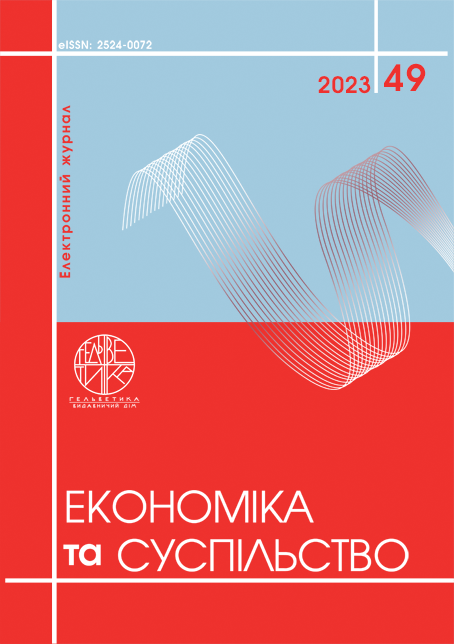PRINCIPLES OF BUSINESS PROCESS MANAGEMENT SYSTEM DEVELOPMENT BASED ON A REFLECTIVE APPROACH
Abstract
Any enterprise operating on the Ukrainian market, regardless of its specialization, size, organizational form, and form of ownership, is a collection of various business processes. Any enterprise operating on the Ukrainian market, regardless of its specialization, size, organizational form, and form of ownership, is a collection of various business processes. Adherence to the principles of development of the business process management system based on a reflexive approach is necessary to ensure the economic and managerial efficiency of business. Together, these principles perform a number of functions – setting business goals and planning ways to achieve them; adaptation to changes in the internal and external environments of the enterprise; coordination of interests of all groups of interested persons; systematicity in management; use of the latest technologies and management methods; satisfaction of customer needs; ensuring permanence in improving staff qualifications and their ability to use best management practices, risk assessment and forecasting, etc. Based on empirical data, it has been proven that a reflective approach includes a systematic analysis and assessment of business processes with the aim of their improvement and optimization. This approach ensures constant self-monitoring and self-assessment of the hosting enterprise, identification of weak points and their improvement. Each of the isolated principles of business process management system development based on a reflexive approach has its own specific features, but they have a common goal – to ensure business stability and reliability through a systematic approach to business process management. It is substantiated that the application of the selected principles in the context of the application of a reflexive approach in the business process management system enables the enterprise to adapt to changes in the external environment and change its business processes in accordance with new market requirements, which guarantees the provision of high quality of the offered services and products to the enterprise. satisfying the needs of customers and ensuring its competitiveness.
References
Волосатова М. Поняття категорії «бізнес-процес» та характерні риси його змісту. Сучасні напрямки розвитку економіки і менеджменту на підприємствах України: Збірник матеріалів ІV всеукраїнської науково-практичної конференції студентів, аспірантів та молодих вчених. Харків : ХНАДУ, 2018. 473 с.
Командровська В., Морозенко О. Бізнес-процеси підприємства: сутність та методи удосконалення. Open Journal Systems. 2011.
Чорнобай Л. Бізнес-процеси підприємства: класифікація та структурно-ієрархічна модель. Економічний аналіз : зб. наук. праць. 2015. Том 22 (2). С. 171–182.
Сiдоренко, М. (2019). Типи бізнес-процесів та як обрати потрібний. https://helpdesk.bitrix24.ua/open/5888493/
Bantash, A., Koval, V., Bashynska, M. & Kozlovtseva, V. (2020). Balanced Territorial Economic Development in the Conditions of Providing Stability of Human Resources Management. Economics. Ecology. Socium. Vol 4, No 3, рр. 58–66.
Ilchenko, S., Khumarova, N., Natalia Maslii, N., Demianchuk, M. & Skribans, V. (2021). Instruments for ensuring the balanced development of maritime and inland waterway transport in Ukraine. E3S Web of Conferences. Vol. 255.
Bantash, A., Koval, V., Bashynska, M. & Kozlovtseva, V. (2020). Balanced Territorial Economic Development in the Conditions of Providing Stability of Human Resources Management. Economics. Ecology. Socium. Vol. 4, No 3, pp. 58–66.
Biryukova, V V. (2020). Production System Management Based on a Balanced Development Model. International science and technology conference «FarEastCon-2019». Vol. 753, Chapter 5.
Igor N. Dubina, David F. J. Campbell, Elias G. Carayannis, Anna A. Chub, Evangelos Grigoroudis & Olga V. Kozhevina. (2017). The Balanced Development of the Spatial Innovation and Entrepreneurial Ecosystem Based on Principles of the Systems Compromise: A Conceptual Framework. Journal of the Knowledge Economy, Springer;Portland International Center for Management of Engineering and Technology (PICMET), Vol. 8(2), pp. 438–455.
Shifa Ma, Yunnan Cai, Dixiang Xie, Xiwen Zhang & Yabo Zhao. (2022). Towards balanced development stage: Regulating the spatial pattern of agglomeration with collaborative optimal allocation of urban land,Cities. Cities: The International Journal of Urban Policy and Planning. Vol. 126.
Volosatova, M. (2018). Ponyattya katehoriyi «biznes-protses» ta kharakterni rysy yoho zmistu [The concept of the category "business process" and the characteristic features of its content]. Suchasni napryamky rozvytku ekonomiky i menedzhmentu na pidpryyemstvakh Ukrayiny: Zbirnyk materialiv IV vseukrayinsʹkoyi naukovo-praktychnoyi konferentsiyi studentiv, aspirantiv ta molodykh vchenykh. Kharkiv: KHNADU, p. 473.
Komandrovsʹka, V. and Morozenko, O. (2011). Biznes-protsesy pidpryyemstva: sutnistʹ ta metody udoskonalennya [Business processes of the enterprise: the essence and methods of improvement]. Open Journal Systems.
Chornobay, L. (2015). Biznes-protsesy pidpryyemstva: klasyfikatsiya ta strukturno-iyerarkhichna modelʹ [Business processes of the enterprise: classification and structural-hierarchical model]. Ekonomichnyy analiz: zb. nauk. pratsʹ, Tom 22 (2), pp. 171–182.
Sidorenko, M. (2019). Typy biznes-protsesiv ta yak obraty potribnyy [Types of business processes and how to choose the right one]. Available at: https://helpdesk.bitrix24.ua/open/5888493/
Bantash, A., Koval, V., Bashynska, M. & Kozlovtseva, V. (2020). «Balanced Territorial Economic Development in the Conditions of Providing Stability of Human Resources Management». Economics. Ecology. Socium. Vol. 4, No 3, рр. 58–66.
Ilchenko, S., Khumarova, N., Natalia Maslii, N., Demianchuk, M. & Skribans, V. (2021). «Instruments for ensuring the balanced development of maritime and inland waterway transport in Ukraine». E3S Web of Conferences. Vol. 255.
Bantash, A., Koval, V., Bashynska, M. & Kozlovtseva, V. (2020). «Balanced Territorial Economic Development in the Conditions of Providing Stability of Human Resources Management». Economics. Ecology. Socium. Vol. 4, No 3, pp. 58–66.
Biryukova, V. V. (2020). «Production System Management Based on a Balanced Development Model». International science and technology conference «FarEastCon-2019». Vol. 753, Chapter 5.
Igor N. Dubina, David F. J. Campbell, Elias G. Carayannis, Anna A. Chub, Evangelos Grigoroudis & Olga V. Kozhevina.(2017). «The Balanced Development of the Spatial Innovation and Entrepreneurial Ecosystem Based on Principles of the Systems Compromise: A Conceptual Framework». Journal of the Knowledge Economy, Springer;Portland International Center for Management of Engineering and Technology (PICMET), Vol. 8(2), pp. 438–455.
Shifa Ma, Yunnan Cai, Dixiang Xie, Xiwen Zhang & Yabo Zhao. (2022). «Towards balanced development stage: Regulating the spatial pattern of agglomeration with collaborative optimal allocation of urban land,Cities». Cities: The International Journal of Urban Policy and Planning. Vol. 126.

This work is licensed under a Creative Commons Attribution 4.0 International License.


